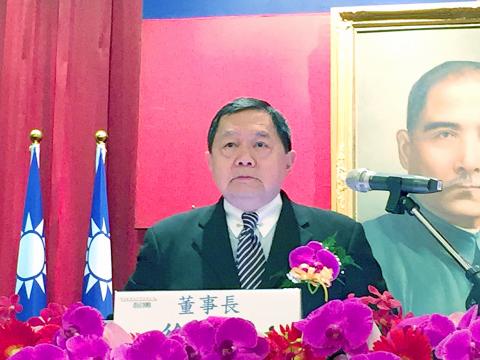Far EasTone Telecommunications Co Ltd (遠傳電信) aims to more than triple revenue contributions from its value-added services to 20 percent within three years on fast-growing demand for its online payment services and mobile video subscriptions.
Value-added services accounted for 6 percent of Far EasTone’s overall revenue in the first half as it has accumulated 9.4 million customers for the services, the nation’s No. 3 telecom said.
“We hope to increase that to 20 percent in 2020,” Far EasTone president Yvonne Li (李彬) told reporters on the sidelines of its annual general meeting yesterday.

Photo: CNA
By that time, the number of subscribers to value-added services is expected to reach 20 million, Li said.
The company said the growth will primarily come from subscriptions to its mobile wallet, mobile videos and billing services for people buying applications in the Apple and Google Play stores.
Far EasTone has more than 700,000 mobile wallet users.
Transactions using the digital payment tool average NT$700 per month per subscriber, the company said.
Far EasTone chief financial officer T.Y. Yin (尹德洋) attributed the growth in its value-added services to the company’s average revenue per user of NT$883 in the first quarter, compared with Chunghwa Telecom Co’s (中華電信) NT$590 and NT$861 for Taiwan Mobile Co (台灣大哥大).
Far EasTone said it aims to increase its number of 4G subscribers to 5.5 million by the end of this year, which would be a rise of 6.38 percent from about 5.17 million in the first quarter.
In the competition over Internet connection speed with local peers, Far EasTone said it expects its 4G users to see speeds accelerate to 500 megabits per second (Mbps) by the middle of next month on existing three-carrier aggregation (3Ca) services, due to spectrum expansion.
The company’s comments came after bigger rival Chunghwa Telecom on Thursday said that Internet connection speeds would rise to 400Mbps next month when it starts using advanced 4Ca technology to better utilize its spectrum.
Far EasTone said about 25 percent of its 4G users’ mobile phones support 3Ca technology, while few devices on the market support 4Ca technology.
Far EasTone shareholders yesterday approved distribution of a cash dividend of NT$3.75 per common share as the company allocated earnings per share (EPS) of NT$3.129 and a capital surplus of NT$0.621 per share toward the dividend.
The company posted EPS of NT$3.5 last year.
Chunghwa Telecom shareholders yesterday approved a plan to distribute a cash dividend of NT$4.94 per share following a seven-and-a-half-hour meeting.
The company reported EPS of NT$5.16 last year.

ISSUES: Gogoro has been struggling with ballooning losses and was recently embroiled in alleged subsidy fraud, using Chinese-made components instead of locally made parts Gogoro Inc (睿能創意), the nation’s biggest electric scooter maker, yesterday said that its chairman and CEO Horace Luke (陸學森) has resigned amid chronic losses and probes into the company’s alleged involvement in subsidy fraud. The board of directors nominated Reuntex Group (潤泰集團) general counsel Tamon Tseng (曾夢達) as the company’s new chairman, Gogoro said in a statement. Ruentex is Gogoro’s biggest stakeholder. Gogoro Taiwan general manager Henry Chiang (姜家煒) is to serve as acting CEO during the interim period, the statement said. Luke’s departure came as a bombshell yesterday. As a company founder, he has played a key role in pushing for the

China has claimed a breakthrough in developing homegrown chipmaking equipment, an important step in overcoming US sanctions designed to thwart Beijing’s semiconductor goals. State-linked organizations are advised to use a new laser-based immersion lithography machine with a resolution of 65 nanometers or better, the Chinese Ministry of Industry and Information Technology (MIIT) said in an announcement this month. Although the note does not specify the supplier, the spec marks a significant step up from the previous most advanced indigenous equipment — developed by Shanghai Micro Electronics Equipment Group Co (SMEE, 上海微電子) — which stood at about 90 nanometers. MIIT’s claimed advances last

CROSS-STRAIT TENSIONS: The US company could switch orders from TSMC to alternative suppliers, but that would lower chip quality, CEO Jensen Huang said Nvidia Corp CEO Jensen Huang (黃仁勳), whose products have become the hottest commodity in the technology world, on Wednesday said that the scramble for a limited amount of supply has frustrated some customers and raised tensions. “The demand on it is so great, and everyone wants to be first and everyone wants to be most,” he told the audience at a Goldman Sachs Group Inc technology conference in San Francisco. “We probably have more emotional customers today. Deservedly so. It’s tense. We’re trying to do the best we can.” Huang’s company is experiencing strong demand for its latest generation of chips, called

EUROPE ON HOLD: Among a flurry of announcements, Intel said it would postpone new factories in Germany and Poland, but remains committed to its US expansion Intel Corp chief executive officer Pat Gelsinger has landed Amazon.com Inc’s Amazon Web Services (AWS) as a customer for the company’s manufacturing business, potentially bringing work to new plants under construction in the US and boosting his efforts to turn around the embattled chipmaker. Intel and AWS are to coinvest in a custom semiconductor for artificial intelligence computing — what is known as a fabric chip — in a “multiyear, multibillion-dollar framework,” Intel said in a statement on Monday. The work would rely on Intel’s 18A process, an advanced chipmaking technology. Intel shares rose more than 8 percent in late trading after the